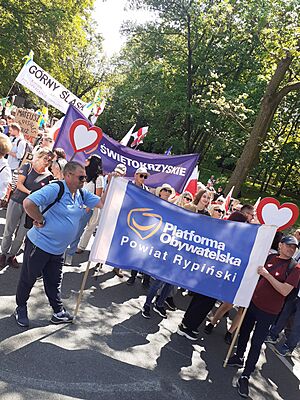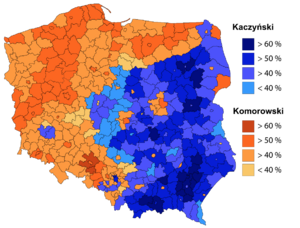Civic Platform facts for kids
Quick facts for kids <div style="padding-top:0.3em; padding-bottom:0.3em; border-top:2px solid Lua error in Module:European_and_national_party_data/config at line 227: attempt to index field 'data' (a nil value).; border-bottom:2px solid Lua error in Module:European_and_national_party_data/config at line 227: attempt to index field 'data' (a nil value).; line-height: 1;">
Civic Platform of
the Republic of Poland Platforma Obywatelska
Rzeczypospolitej Polskiej |
|
|---|---|
 |
|
| Abbreviation | PO |
| Chairman | Donald Tusk |
| General Secretary | Marcin Kierwiński |
| Parliamentary leader | Zbigniew Konwiński |
| Spokesperson | Jan Grabiec |
| Founders |
|
| Founded | 24 January 2001 |
| Split from |
|
| Headquarters | ul. Wiejska 12A, 00-490 Warsaw |
| Membership (2023) | 24,497 |
| Ideology |
|
| Political position | Centre-right |
| National affiliation | Civic Coalition Senate Pact 2023 (for 2023 Senate election) |
| European affiliation | European People's Party |
| European Parliament group | European People's Party Group |
| Colours |
|
| Sejm |
126 / 460
|
| Senate | Lua error in Module:European_and_national_party_data/config at line 227: attempt to index field 'data' (a nil value). |
| European Parliament | Lua error in Module:European_and_national_party_data/config at line 227: attempt to index field 'data' (a nil value). |
| Regional assemblies |
210 / 552
|
| City presidents |
39 / 107
|
| Website | |
| Lua error in Module:European_and_national_party_data/config at line 227: attempt to index field 'data' (a nil value). | |
The Civic Platform (in Polish: Platforma Obywatelska, or PO) is a major political party in Poland. It is considered a centre-right party. This means its ideas are generally in the middle of the political spectrum, leaning towards conservative and liberal views.
The party's leader is Donald Tusk. He was also the leader from 2003 to 2014. From 2014 to 2019, he served as the President of the European Council, an important job in the European Union.
Civic Platform was created in 2001. It was formed by politicians who left other parties. It quickly became a major party. In 2007, it won the parliamentary election, and Donald Tusk became the Prime Minister of Poland. The party also won the presidential election in 2010 with its candidate, Bronisław Komorowski.
After Tusk left to work for the European Council in 2014, the party lost the elections in 2015. It remained the main opposition party for several years. In 2023, it returned to power as the leader of a group of parties called the Civic Coalition.
The party strongly supports Poland's membership in the European Union and NATO. It is a member of the European People's Party, a group of similar centre-right parties from across Europe.
Contents
History of the Party
How Civic Platform Began
Civic Platform was founded on January 24, 2001. Its founders were Andrzej Olechowski, Maciej Płażyński, and Donald Tusk. They came from different political groups but shared ideas about the economy and democracy.
In its first election in 2001, the party came in second. This made it the largest opposition party in the Sejm, which is Poland's main house of parliament. For a while, it worked with another party called Law and Justice (PiS). They even had a nickname, POPiS.
However, this partnership did not last. The two parties started to disagree on many issues. By the 2005 elections, they were competing against each other.
Years in Government (2007–2015)
In the 2007 parliamentary election, Civic Platform won the most votes. It received 41.5% of the vote and got 209 seats in the Sejm. Donald Tusk became the Prime Minister. He formed a government with the Polish People's Party (PSL).
In 2010, in a plane crash in Smolensk, Russia, the Polish president, Lech Kaczyński was killed. The acting president became Bronisław Komorowski of Civic Platform. Later that year, Komorowski won the presidential election. This gave the party control of both the government and the presidency.
The party won again in the 2011 parliamentary election. This made Donald Tusk's government the first to be re-elected since the end of communism in Poland in 1989.
Years in Opposition (2015–2023)
In 2014, Donald Tusk was chosen to be the President of the European Council. He was replaced as Prime Minister by Ewa Kopacz.
In the 2015 presidential election, Bronisław Komorowski lost to Andrzej Duda from the PiS party. Later that year, Civic Platform also lost the parliamentary election to PiS. For the next eight years, Civic Platform was the main opposition party.
During this time, the party formed the Civic Coalition with other parties to compete in elections. In 2021, Donald Tusk returned to Polish politics and became the leader of Civic Platform again.
Return to Power in 2023
In the 2023 parliamentary election, the Civic Coalition, led by Civic Platform, came in second place. However, the leading PiS party could not form a government.
So, the Civic Coalition joined with two other political groups to form a new government. In December 2023, Donald Tusk became Prime Minister of Poland for the second time.
What the Party Believes In
Civic Platform is mainly a centre-right party. Its ideas have changed over time.
Economic Ideas
When it started, the party had strong economically liberal ideas. This means it supported lower taxes and less government control over the economy.
While in power, the party's policies were more practical and aimed at the center. For example, instead of creating a flat tax, it raised the value-added tax (a tax on goods and services). After returning to power in 2023, the party focused on lowering some taxes for businesses.
The party also has a plan to deal with the climate crisis. It has promised to stop using coal to produce energy in Poland by the year 2040.
Social Ideas
On social issues, the party started as more conservative, based on Christian democratic values. Over the years, it has become more liberal.
For example, the party now supports civil unions for same-sex couples.
The party has also taken a strong stance against illegal immigration, especially from Russia and Belarus.
Who Supports the Party?
Civic Platform gets most of its support from certain groups of people and parts of the country.
- Location: The party is very popular in big cities like Warsaw, and in the western and northern parts of Poland. It is less popular in small towns and the countryside.
- Voters: Supporters are often well-educated, middle-class people with professional jobs. This includes managers, specialists, and business owners.
- Beliefs: Many of its voters are pro-European. They want Poland to have a strong relationship with the European Union. They also tend to be moderate in their religious and political views.
The party also has support from regional groups, like the Kashubians in the north and Silesian regionalists in the south. Donald Tusk, who is Kashubian himself, has promised to recognize the Silesian language officially.
Party Leaders
| No. | Image | Name | Tenure |
|---|---|---|---|
| 1 |  |
Maciej Płażyński | 18 October 2001– 1 June 2003 |
| 2 |  |
Donald Tusk | 1 June 2003– 8 November 2014 |
| 3 |  |
Ewa Kopacz | 8 November 2014– 26 January 2016 |
| 4 |  |
Grzegorz Schetyna | 26 January 2016– 29 January 2020 |
| 5 |  |
Borys Budka | 29 January 2020– 3 July 2021 |
| (2) |  |
Donald Tusk | since 3 July 2021 |
Election Results
Presidential Elections
| Election year | Candidate | 1st round | 2nd round | ||
|---|---|---|---|---|---|
| # of votes | % of vote | # of votes | % of vote | ||
| 2005 | Donald Tusk | 5,429,666 | 36.3% (#1) | 7,022,319 | 46.0% (#2) |
| 2010 | Bronisław Komorowski | 6,981,319 | 41.5% (#1) | 8,933,887 | 53.0% (#1) |
| 2015 | Supported Bronisław Komorowski | 5,031,060 | 33.8% (#2) | 8,112,311 | 48.5% (#2) |
| 2020 | Rafał Trzaskowski | 5,917,340 | 30.5% (#2) | 10,018,263 | 48.9% (#2) |
| 2025 | Rafał Trzaskowski | 6,147,797 | 31.4% (#1) | 10,237,286 | 49.1% (#2) |
Sejm Elections (Parliament)
| Election | Leader | Votes | % | Seats | +/– | Government |
|---|---|---|---|---|---|---|
| 2001 | Maciej Płażyński | 1,651,099 | 12.7% (#2) |
65 / 460
|
New | Opposition |
| 2005 | Donald Tusk | 2,849,259 | 24.1% (#2) |
133 / 460
|
Opposition | |
| 2007 | Donald Tusk | 6,701,010 | 41.5% (#1) |
209 / 460
|
PO–PSL Coalition | |
| 2011 | Donald Tusk | 5,629,773 | 39.2% (#1) |
207 / 460
|
PO–PSL Coalition | |
| 2015 | Ewa Kopacz | 3,661,474 | 24.1% (#2) |
138 / 460
|
Opposition | |
| 2019 | Grzegorz Schetyna | 5,060,355 | 27.4% (#2) |
102 / 460
|
Opposition | |
| As part of Civic Coalition, which won 134 seats in total. | ||||||
| 2023 | Donald Tusk | 6,629,402 | 30.7% (#2) |
127 / 460
|
Coalition Government | |
| As part of Civic Coalition, which won 157 seats in total. | ||||||
Images for kids
-
Bronisław Komorowski, former President of Poland (2010-2015)
-
Jerzy Buzek, former President of the European Parliament (2009-2012) and former Prime Minister of Poland (1997-2001)
-
Borys Budka, former leader of Civic Platform (2020-2021)
-
Hanna Gronkiewicz-Waltz, former Mayor of Warsaw (2006-2018)
-
Rafał Trzaskowski, Mayor of Warsaw and presidential candidate
See also
 In Spanish: Plataforma Cívica para niños
In Spanish: Plataforma Cívica para niños
- List of Civic Platform politicians
- Politics of Poland
- List of political parties in Poland
- Liberalism in Poland
 | Aaron Henry |
 | T. R. M. Howard |
 | Jesse Jackson |










